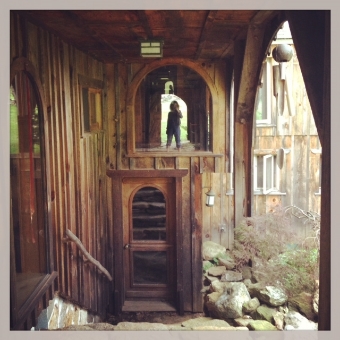During a coaching session last week, a client of mine shared one of her biggest fears with me.
Maybe you can relate.
It’s a fear that I’ve heard many women I’ve worked with express.
A fear that I’ve grappled with ad nauseam.
And a fear that still visits me each time I sit down to write.
In fact this fear is riding shotgun right now as I type these words.
It’s the fear of sharing her voice. In her work, and in her life.
Without apology or negotiation.
I’ve heard this challenge from women so often, and have felt it so acutely myself, that it seems important to address.
For the sake of all of us who have a story to share, or a possibility we're yearning to create—
but choose to stay quiet, or hide out, or sterilize our point of view into something more pleasing and agreeable for the sake of others.
Here’s my plea to you:
We need your strong voices. Your stories are valuable.
Especially voices and stories that share the truth.
We need as many as we can get
The truth of your experience... the truth of your perspective...
Tell us like it is.
It’s what keeps us connected, how wisdom is passed down, how we all feel a little less alone.
Speaking our truth without apology is how we set ourselves free…
From the constant concern of how others will see us.
From the expectations of who we “should” be.
One hard truth. No one will ever give you the permission to take up space or be vocal.
That permission is only self-granted.
Not to gender generalize, but this is especially true for women.
It’s sucky, I know, but it’s the material that we’re working with.
Which means that it’s up to us to learn how to share our voices in way that is decisive and meaningful.
It’s our work. No one can hand us the permission slip.
In fact..
Either we tell our stories or someone else will shape them for us.
There are plenty of people who are happy to tell us who they think we “should” be. It’s often well intentioned. In the guise of friendly advice. It also shapes us in their image. Which is not necessarily the truth of who we are. Something precious is lost in our silence.
1:: NAME THE ARCHITECTS OF YOUR GLASS CIELINGS
Somewhere in our lives we’ve learned to fear what might happen if we let our voices be heard.
The concern of negative impact or outcome.
If we sift through the contents of our experiences we can probably name the moments when our personal glass ceilings were constructed.
Perhaps it was well meaning friends and family who encouraged you to “never change”.
Maybe it was the mocking or teasing you faced when you let yourself be vulnerable.
Or the mythology that women should be pretty and quiet that seeped into your family tree.
One of my thickest glass ceilings was built in the 4th grade, when my well-intentioned mom forbade me from performing at the school talent show.
I was planning a one-woman lip sync to En Vogue’s “Free Your Mind”, complete with a neon-green leotard and floppy brimmed hat, circa 1992. (Lord, I wish I had photo of this.)
I thought I was hot shit. I couldn’t wait to do my show.
She told me I would embarrass myself. And put the kibosh on my performance.
In retrospect, I can understand where my mom was coming from.
I was a chubby kid in a neon leotard, and it is a song with undertones that I was too young to understand.
Her intention was to save me from the ridicule of my peers.
But It’s the first time I became painfully aware that making myself visible would also make me look foolish.
We all have moments like this, as we learned how the world works, and how to safely navigate it.
It’s our jobs to recognize where our beliefs stem from. Understand who helped us build them and why. Then give them a bless and release.
Sometimes our glass ceilings crack in the moment we witness their construction.
Oftentimes, it takes repeated work. Like a mantra we carry with us, to chip at our ceiling each time that we hit it.
Breaking through means truly releasing the story with full-on blessing and understanding.
Because when we release our old hangups, fears, and mythologies, it’s actually us who is released.
(Thank you mom, for protecting me. I set that story free.)
2:: INTERROGATE YOUR ANXIETY
If you’re skittish at the thought of sharing your voice, it might be time to take it to trial.
Invite your anxiety up to the witness stand and ask it to make a testimony.
Chances are the evidence it will present sounds a little something like this:
“What if I share what I have to say and no one listens to me?
Or worse. They think I’m a fraud?
What if I’m criticized for what I believe in?
Or people think I’m arrogant or a know it all?
What if I fall flat on my face (and prove my worst fears right)?"
Cross examine your anxiety with a little Socratic Questioning:
Is it True?
How do I know it’s true?
Could it be another way?
2 :: INVITE YOUR FEAR TO RIDE SHOTGUN
Sometimes the most skillful thing we can do is make space for our fear to come along for the ride.
Fear is a shape-shifter, especially when it comes to speaking up for ourselves.
In one moment, it may seem that we have our anxiety licked— after we’ve stood up for ourselves in a new way, or shared our story in a way that is brave and honest.
And then…
Our anxiety puts on a different hat and shiny new shoes and manifests as a fresh doubt or hesitation when we’re reaching for our gumption.
Slippery little sucker.
Rather than trying to fight, crush, battle, or do something equally aggressive to our anxieties, take a moment to recognize that Fear’s main job is to look out for us. To keep us safe. To make sure we don’t hurt ourselves.
Anxiety is actually our advocate, in a twisted, often misinformed way.
When we recognize that our fear of sharing our voices is simply a personal defense, we can turn and look at it head on.
Perhaps even thank it for it’s information.
And then make space for it to ride shotgun in the front seat with us. As we go ahead act bravely anyway









